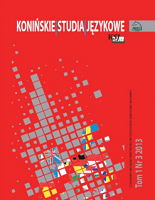Metacognitive translator competence: From other-regulation to self-regulation
Metacognitive translator competence: From other-regulation to self-regulation
Author(s): Paulina PietrzakSubject(s): Language studies, Education, Translation Studies
Published by: Akademia Nauk Stosowanych w Koninie
Keywords: translator competence; translator expertise; translation education; translator training; metacognitive skills; self-regulation; metacognitive awareness;
Summary/Abstract: This paper explores the construct of metacognition and metacognitive skills in relation to translator training. It attempts to illustrate the role of metacognition as a facilitative factor in the professional translator career. Given that it is of primary importance in translator education to help translation students recognize the need for lifelong education and further development of their skills, the article discusses models of self-regulated learning and stresses the need for a transition from other-regulation to self-regulation. Metacognitive approach to translator training conceives of translator competence as based on personal resources, that is, aspects of the self that refer to the sense of ability to successfully meet demands, which make up the psychological capital of the translator (Pietrzak, 2022). Metacognitive translator competence is understood here as the ability to self-regulate cognitive processes that contribute to goal achievement and translator professional success (ibid.). The article reports on an exploratory study on translation graduates with particular attention to the effects of metacognitive awareness on their professional development. The data collected and analyzed in the study show correlations between metacognitive awareness and professional development as reflected in the career path and perceived success.
Journal: Konińskie Studia Językowe
- Issue Year: 9/2021
- Issue No: 2
- Page Range: 229-247
- Page Count: 19
- Language: English

